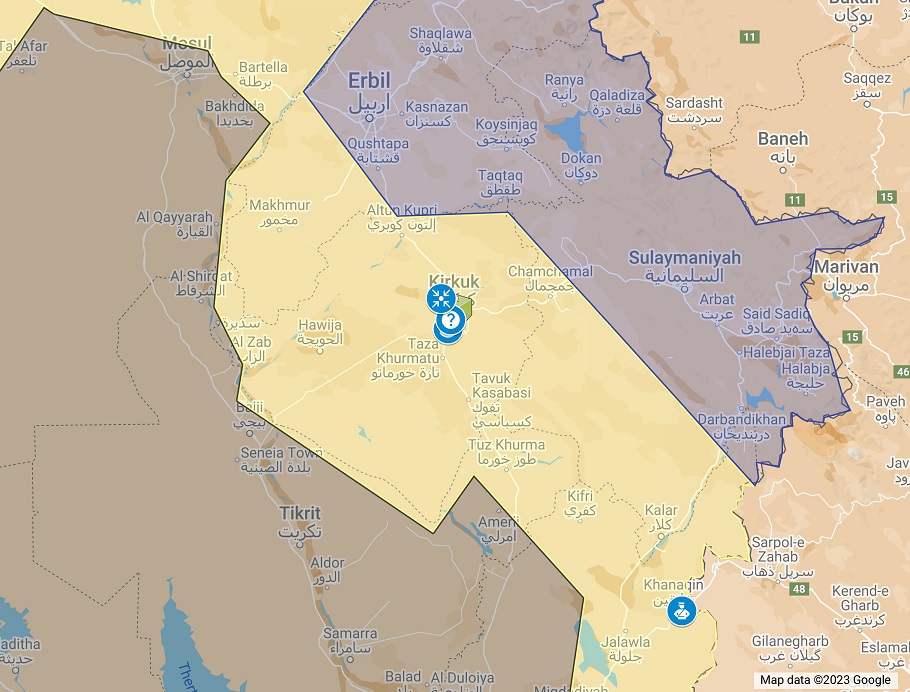Kirkuk
- The Independent High Electoral Commission (IHEC) has officially concluded the registration process for parties and coalitions participating in the upcoming provincial elections scheduled for December 18, 2023. Notably, no unified coalition could be formed for any ethnic group: Kurds, Arabs, and Turkmen.
The Kurdish representation in the elections will be segmented into four major coalitions:
1- The Kurdistan Democratic Party (KDP) leading a coalition with smaller affiliated parties.
2- T1he Patriotic Union of Kurdistan (PUK) forming an alliance with the Kurdistan Communist Party.
3- The Torch of Kirkuk coalition, comprising the Kurdistan Islamic Union and the Kurdistan Justice Group.
4- The New Generation coalition.
On the Arab front, the Arab representation will be divided among three prominent coalitions:
1- The Arab Coalition of Kirkuk, led by Rakan Juburi, the acting governor.
2- The Leadership Coalition, which includes the Progress Party (Al-Takadum) and the Sovereignty Party.
3- The Alliance of Kirkuk Arabism, consisting of the Resolve Party (al Azem) and the Arab Front.
Among the Turkmens, two distinct entities will partake in the elections:
1-The United Turkmen Front List.
2- A list led by Arshad Salihi, the details of which are yet to be disclosed.
- On August 6th, two individuals, reportedly linked to the Kirkuk Social Welfare Network, were arrested for accepting a bribe. The Integrity Commission revealed that these employees had arranged an off-site location for a citizen to make a bribe payment and sign a document. In response, the Kirkuk Social Welfare Network denied any affiliation with the arrested individuals, despite a video showing them being apprehended while accepting bribes. It’s noteworthy that there has been an alleged increase in bribery within institutions since October 16, 2017, with suspicions that some involved individuals have been able to secure their release by paying bribes.
- A memorandum released by the Kirkuk General Directorate of Education on August 9th outlined updated regulations that restrict male teachers from instructing in girls’ schools, with the exception of elementary schools. The decision, endorsed by Education Director Raad Abdullah, includes a warning of potential legal consequences for school administrations found to be in breach of the stipulated regulations.
- On August 7th, Hayyan Abdul Ghani, the Iraqi Oil Minister, arrived in Kirkuk and paid a visit to the Northern Oil Company (NOC). As per an official statement from the Ministry of Oil, the purpose of the visit was to assess the ongoing oil projects within the city. During his visit, he held discussions with NOC officials in the presence of acting Governor Al Jabouri. While not officially confirmed, media reports suggest that the visit aimed at finding a resolution to the matter of suspended oil exports through Turkey since March 22.
Khanaqin
- Starting on August 8th, demonstrations erupted in the Khanaqin district due to the persistent electricity shortage, and these protests have spanned over a three-day period. Demonstrators voiced their grievances about enduring a mere six hours of electricity per day, a significant concern considering Khanaqin ranks as the third hottest city in Iraq in terms of recorded temperatures. Notably, on the second day of protests, demonstrators blocked the international road at the Munziriyah border crossing. Following the arrival of a high-ranking security delegation to the area, the protesters succinctly communicated their demand for improved electricity supply: “We want electricity.” In response, the Khanaqin mayor’s office attributed the decline in electricity provision to the suspension of electricity exports by Iran.

